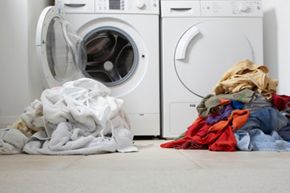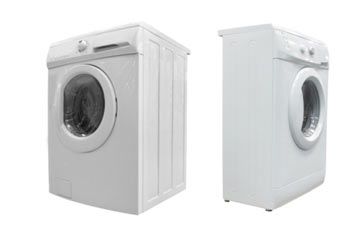Your faithful washing machine has been swishing away with a daily resignation that's easy to envy. (We're much fussier about our household chores.) But according to the Alliance to Save Energy, older washing machines are one of the top five most costly appliances [source: Smith].
When it comes to conserving natural resources -- and reducing the family utility bill -- there's no denying the allure of high-efficiency (HE) models. But HE models, which range from $500 to $1,600, will cost us a bit more than a traditional unit. Are they worth the extra expense?
Advertisement
As it turns out, yes. A shiny new HE washer will save so much in operating costs throughout the next several years, it'll be like getting the matching dryer for free [source: Energy Star]. High-efficiency washers cost less to operate because they use less water and energy -- and even less detergent. Most HE machines are front-loading machines, and this design uses about 20 gallons of water per load -- half of what's required by a traditional washer [source: CEC].
The water savings are largely due to the way HE washers are engineered: Instead of filling a large internal tub to the high-water mark, HE units use a sparse amount of water that rests in the bottom of the tub. Then, rather than grinding clothes through an agitating motion to cleanse them, an HE washer tumbles its contents horizontally. As the load rotates through the water, it's cleansed and then rinsed. The process is as close to washing by hand as we'll get from a machine, and this saves a lot of wear and tear on delicate garments.
Using less water and energy also means you'll have lower utility bills. In fact, a U.S. Department of Energy report estimates an HE washer will have one-third the operating costs of your older, top-loading washer [source: BeWaterSmart.org]. You can save even more energy by washing in cold water. As it turns out, up to 90 percent of the expense of washing clothes can be attributed to the electrical effort it takes to heat the water; using hot water to wash your clothes costs an estimated $150 each year [source: Bluejay]. And we haven't even figured in the costs to operate your dryer, too.
The good news is that if you have an HE washing machine, your clothes are sure to enter the spin cycle a step ahead of those washed in traditional machines. An HE machine uses less water to wash your clothes, which means they can be separated from the water more efficiently during the spin cycle. By the time you transfer them to the dryer, they'll take less time -- and energy -- to come out toasty. Sounds like another good argument for an upgrade, right?
Advertisement


